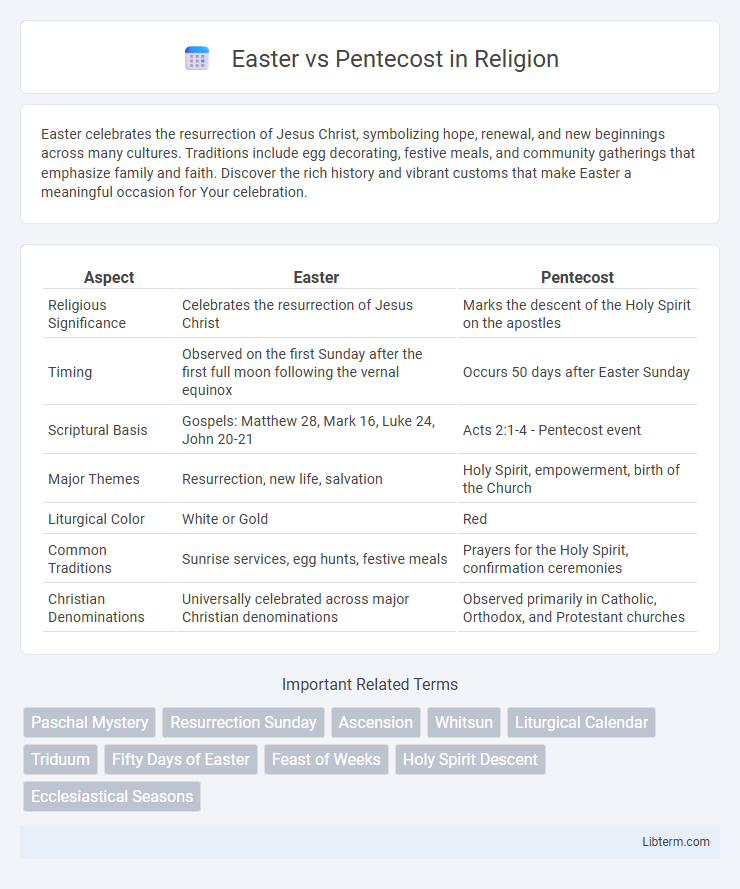Easter celebrates the resurrection of Jesus Christ, symbolizing hope, renewal, and new beginnings across many cultures. Traditions include egg decorating, festive meals, and community gatherings that emphasize family and faith. Discover the rich history and vibrant customs that make Easter a meaningful occasion for Your celebration.
Table of Comparison
| Aspect | Easter | Pentecost |
|---|---|---|
| Religious Significance | Celebrates the resurrection of Jesus Christ | Marks the descent of the Holy Spirit on the apostles |
| Timing | Observed on the first Sunday after the first full moon following the vernal equinox | Occurs 50 days after Easter Sunday |
| Scriptural Basis | Gospels: Matthew 28, Mark 16, Luke 24, John 20-21 | Acts 2:1-4 - Pentecost event |
| Major Themes | Resurrection, new life, salvation | Holy Spirit, empowerment, birth of the Church |
| Liturgical Color | White or Gold | Red |
| Common Traditions | Sunrise services, egg hunts, festive meals | Prayers for the Holy Spirit, confirmation ceremonies |
| Christian Denominations | Universally celebrated across major Christian denominations | Observed primarily in Catholic, Orthodox, and Protestant churches |
Introduction to Easter and Pentecost
Easter commemorates the resurrection of Jesus Christ from the dead, marking the cornerstone of Christian faith celebrated on the first Sunday after the first full moon following the vernal equinox. Pentecost occurs fifty days after Easter, signifying the descent of the Holy Spirit upon the apostles, enabling them to spread the teachings of Jesus. Both holidays hold profound theological significance, representing resurrection and spiritual empowerment within Christianity.
Historical Origins of Easter and Pentecost
Easter originates from early Christian celebrations commemorating the resurrection of Jesus Christ, rooted in Jewish Passover traditions and first documented in the 2nd century AD. Pentecost, occurring 50 days after Easter, has origins in the Jewish Feast of Weeks (Shavuot), marking the descent of the Holy Spirit upon Jesus' disciples as described in the Acts of the Apostles. Both holidays reflect significant events in Christian theology, with Easter highlighting resurrection and Pentecost emphasizing the birth of the Church through divine empowerment.
Biblical Foundations of Easter
Easter is founded on the biblical account of Jesus Christ's resurrection on the third day after His crucifixion, as described in the Gospels of Matthew, Mark, Luke, and John, symbolizing the victory over sin and death (Matthew 28:1-10). This event fulfills Old Testament prophecies and highlights the promise of eternal life for believers (Isaiah 53, 1 Corinthians 15:3-4). Pentecost, occurring fifty days after Easter, marks the outpouring of the Holy Spirit on the apostles, empowering the birth of the Christian Church as recorded in Acts 2.
Biblical Foundations of Pentecost
Pentecost, rooted in the biblical event recorded in Acts 2, marks the outpouring of the Holy Spirit upon the apostles, empowering them for mission and establishing the early Church. This event fulfills Old Testament prophecies found in Joel 2:28-29 about the Spirit being poured out on all believers. Unlike Easter, which centers on the resurrection of Jesus Christ, Pentecost emphasizes the ongoing presence and work of the Holy Spirit in believers' lives and the birth of the Christian community.
Key Differences Between Easter and Pentecost
Easter commemorates the resurrection of Jesus Christ from the dead, marking the foundation of Christian faith, while Pentecost celebrates the descent of the Holy Spirit upon the apostles, empowering the early Church. Easter is observed on the first Sunday after the first full moon following the vernal equinox, whereas Pentecost occurs fifty days after Easter Sunday. Key differences include the theological focus--resurrection versus the Holy Spirit's empowering--and their respective roles in Christian liturgy and symbolism.
Significance in Christian Theology
Easter holds primary significance in Christian theology as it commemorates the resurrection of Jesus Christ, symbolizing victory over sin and death and affirming the promise of eternal life. Pentecost marks the descent of the Holy Spirit upon the apostles, empowering the early Church for mission and symbolizing the birth of the Christian community. Together, these events underscore foundational beliefs in redemption, divine presence, and the ongoing work of the Holy Spirit in believers' lives.
Traditional Celebrations and Customs
Traditional Easter celebrations feature sunrise services, egg hunts, and festive family meals symbolizing resurrection and renewal. Pentecost customs include church services emphasizing the Holy Spirit's descent, often marked by red vestments, special prayers, and decorations with symbols like doves and flames. Both holidays incorporate communal gatherings, but Easter centers on Christ's resurrection while Pentecost highlights spiritual empowerment and the birth of the Church.
Symbolism Associated with Easter
Easter symbolizes resurrection and new life, marked by the empty tomb and the rising of Jesus Christ, representing hope and renewal in Christian faith. The use of symbols like the Easter lily, symbolizing purity and resurrection, and the Easter egg, signifying fertility and rebirth, emphasizes themes of transformation and spiritual awakening. In contrast to Pentecost, which celebrates the Holy Spirit's descent and the birth of the Church, Easter centers on Christ's triumph over death and the promise of eternal life.
Symbolism Associated with Pentecost
Pentecost symbolizes the descent of the Holy Spirit upon the apostles, often represented by flames or tongues of fire, signifying divine inspiration and empowerment. It marks the birth of the Christian Church, emphasizing themes of renewal, spiritual awakening, and unity among believers. The dove is another common symbol, denoting peace, purity, and the Holy Spirit's presence during this key event in Christian tradition.
Lasting Impact of Easter and Pentecost on Christianity
Easter marks the resurrection of Jesus Christ, establishing the foundation of Christian faith by affirming eternal life and victory over sin and death. Pentecost commemorates the descent of the Holy Spirit, empowering the apostles to spread the Gospel and catalyzing the birth of the Christian Church. Together, these events shape core Christian doctrines, worship practices, and community identity, sustaining faith traditions across centuries.
Easter Infographic

 libterm.com
libterm.com